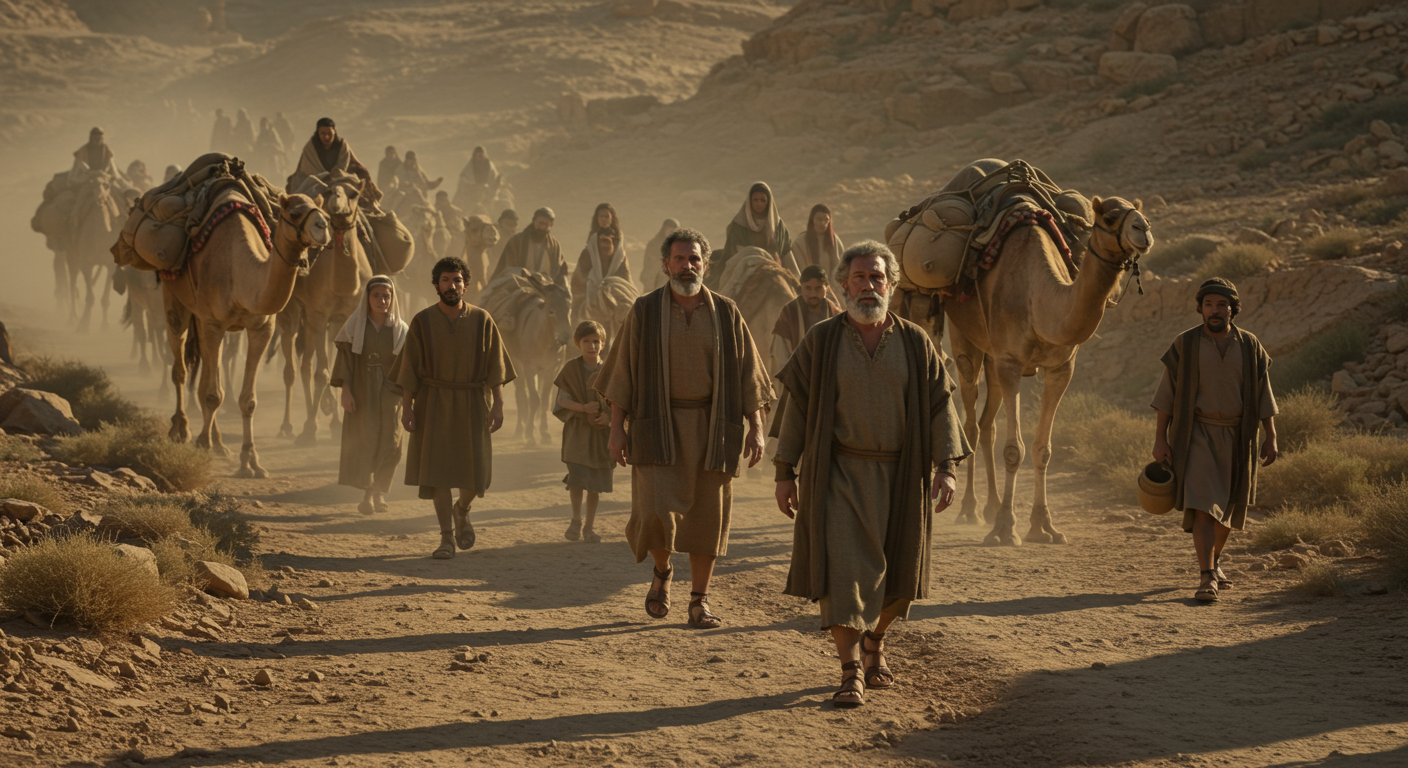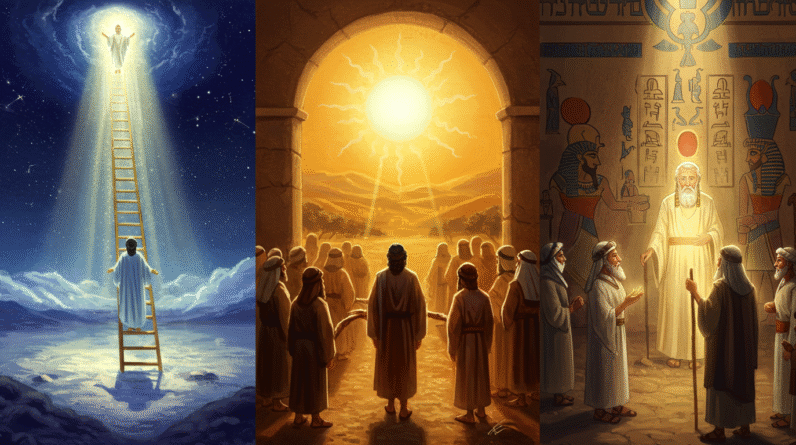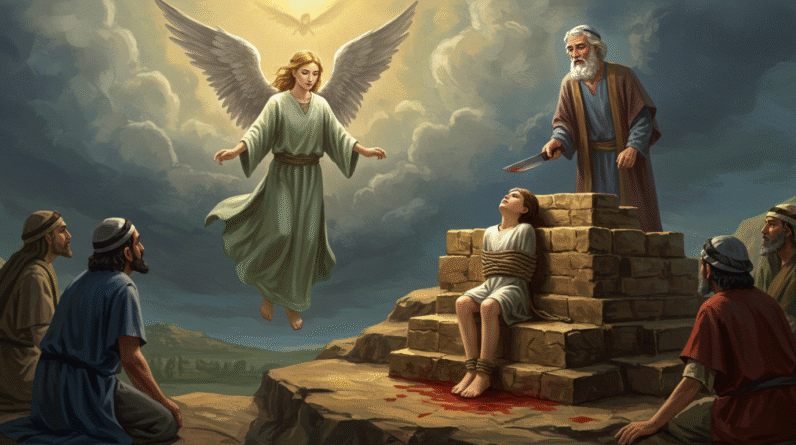When God Called Abraham: 7 Bold Decisions That Changed History
You don’t have to squint too hard to imagine the sandy dunes stretching endlessly under a blazing sun, the echoes of livestock groaning in the distance, and amidst it all, one man’s silent contemplation interrupted by a divine whisper. This is the setting for one of the most significant encounters in the biblical narrative—when God called Abraham. This pivotal moment isn’t just a page in history; it’s an unfolding drama that reshaped how humanity would understand faith, purpose, and divine promise. So, let’s stroll down this ancient path together, as you reflect on the unwavering journey of faith that began with one man and one call. Buckle up, because you’ll want to dive deeply into each of the seven bold decisions that transformed the trajectory of history.
The Unfamiliar Call
When God called Abraham, it was a moment unlike any other. Genesis 12:1-3 encapsulates the profound summons: “The LORD had said to Abram, ‘Go from your country, your people and your father’s household to the land I will show you.'” Can you imagine it? You’re standing there, maybe with your feet firmly grounded in comfort, facing a call to leave everything you’ve known. Abraham’s first monumental decision was to heed this unfamiliar call. This wasn’t just about moving house; it was about upending his world. For you, what unfamiliar call might you be resisting because it’s just too unknown?
Abraham’s decision invites you to step into the unknown with confidence—not because you know where it will lead, but because you trust the One who leads you. It’s an awe-inspiring reminder that adhering to a higher purpose sometimes means loosening your grip on comfort and familiarity.
Walking Away from the Known
After making the decision to heed God’s call to Abraham, Abraham faced another challenge—physically leaving his home. Genesis 12:4-5 says, “So Abram went, as the LORD had told him.” It wasn’t just a theoretical assent; Abraham decisively walked away from what he knew. Imagine saying goodbye to not just your home, but every part of your world that feels like “yours.” Leaving your comfort zone is hardly ever easy, but Abraham’s story reminds you that sometimes the most extraordinary chapters of life emerge when you close the door behind an old one.
This decision of departing serves as a humbling reflection. You can easily get complacent, stuck in what is familiar and secure. But there’s an untold promise in every goodbye. It’s in those quiet, brave moments of stepping forward—with perhaps your heart pounding—that you’re opening yourself to the opportunity of transformation. Adventure might just be waiting for you, right outside your comfort zone.
Embracing Divine Promises
With the call and departure, came the promise. God did not leave Abraham without hope. Genesis 12:2 holds the promise: “I will make you into a great nation, and I will bless you.” This wasn’t a fleeting assurance—it was a covenant that carried divine magnitude. Abraham’s third bold decision was to embrace this divine promise amidst a reality that hadn’t yet changed. Isn’t that often the hardest part, believing in a promise that hasn’t manifested yet? Here is where you find awe, realizing Abraham’s faith exemplified a trust you can strive to cultivate.
The beauty of this decision shines a light on your own life. What promises are quietly resting in your heart, waiting to be believed? Faith often requires you to see beyond what is visible and rest in what has been spoken to you. The lesson here is not just to see God’s promises as hopeful whispers but as foundations upon which you can rest your life’s journey.

Building Altars of Worship
Journeying through the desert, you’ll find that Abraham didn’t just wander. He actively engaged with his faith by building altars—physical places of worship and commitment. Genesis 12:7-8 echoes this: “There he built an altar to the LORD and called on the name of the LORD.” This decision to build altars was profound. It was a way of tangibly expressing his spiritual alignment and dependence on God. In doing so, Abraham’s journey was marked—not just physically, but spiritually.
You are reminded here of the importance of establishing your own “altars,” be it through quiet reflection, tangible acts of worship, or moments dedicated to gratitude. Such acts fortify your connection to God’s presence. As you consider your life’s journey, what are the personal altars you’ve built to remind yourself of your commitment? Maybe it’s in your daily habits or the communities you build. These places of worship can become anchors during life’s storms, a reminder that worship isn’t a mere ritual, but a meaningful act of connection.
Generosity as a Reflection of Trust
Abraham’s journey was not just about receiving promises—it was also about the embodiment of those promises through his character. One striking instance was his generous spirit towards Lot when they needed to part ways due to land disputes (Genesis 13:8-9). “Let’s not have any quarreling between you and me,” Abraham said. Instead of clinging to the best for himself, he allowed Lot to choose first, demonstrating trust in God’s provision.
In today’s world, where the mentality often leans towards self-preservation and accumulation, Abraham’s generosity provides a counter-narrative. Generosity, at its core, is a reflection of trust—in God’s provision and the abundance of His blessing. Reflect on your own opportunities to practice generosity, not just as an act of kindness, but as a statement of faith. Generosity is less about losing and more about manifesting a heart that believes there’s more than enough to go around.
Trusting Despite Trials
Despite the vast promises, Abraham faced trials. Genesis 12:10 tells of a famine that struck the land. He momentarily detoured to Egypt, and you see a human side of him—a mix of fear and faith. Yet, through these trials, Abraham’s overarching decision was to trust. Even when reality seemed to challenge the promises, his story kept returning to a place of faith and recommitment.
Here, you’re reminded of how trials can either erode or strengthen your trust. In these testing moments, like Abraham, the decision lies in how you navigate your trust. It is these pivotal junctures where faith matures and multiplies. Consider what trial you might be navigating and choose to trust, even when the view ahead feels dim or uncertain.
Becoming the Father of Nations
Finally, against all odds, Abraham’s decision to believe in God’s promise culminated in an unimaginable legacy. Genesis 17:5 recounts that God declared, “I have made you a father of many nations.” Abraham had no point of reference for understanding the full weight of this—but he believed, and his lineage was transformed into a nation that impacts you even today.
As you stand in awe of this legacy, you’re reminded that your decisions, though seemingly small, can echo through generations. What will your legacy reflect? The encouragement here is to let faith—decidedly bold and resistant to doubt—leave footprints for generations that come after. In Abraham’s story, you’re invited to grasp that even your small, everyday choices can have a lasting, wide-reaching impact.
Reflect, Share, and Grow
As you meander back through the sands of time and Abraham’s walk of faith, consider the spectrum of decisions that met each challenge he faced. They were woven into a narrative that defined not only his legacy but the faith of countless believers who would come after.
Explore More
For further reading and encouragement, check out these posts:
👉 7 Bible Verses About Faith in Hard Times
👉 Job’s Faith: What We Can Learn From His Trials
👉 How To Trust God When Everything Falls Apart
👉 Why God Allows Suffering – A Biblical Perspective
👉 Faith Over Fear: How To Stand Strong In Uncertain Seasons
👉 How To Encourage Someone Struggling With Their Faith
👉 5 Prayers for Strength When You’re Feeling Weak

📘 Jesus and the Woman Caught in Adultery – Grace and Mercy Over Judgement
A powerful retelling of John 8:1-11. This book brings to life the depth of forgiveness, mercy, and God’s unwavering love.
👉 Check it now on Amazon
As a ClickBank Affiliate, I earn from qualifying purchases.
Acknowledgment: All Bible verses referenced in this article were accessed via Bible Gateway (or Bible Hub).
“Want to explore more? Check out our latest post on Why Jesus? and discover the life-changing truth of the Gospel!”








